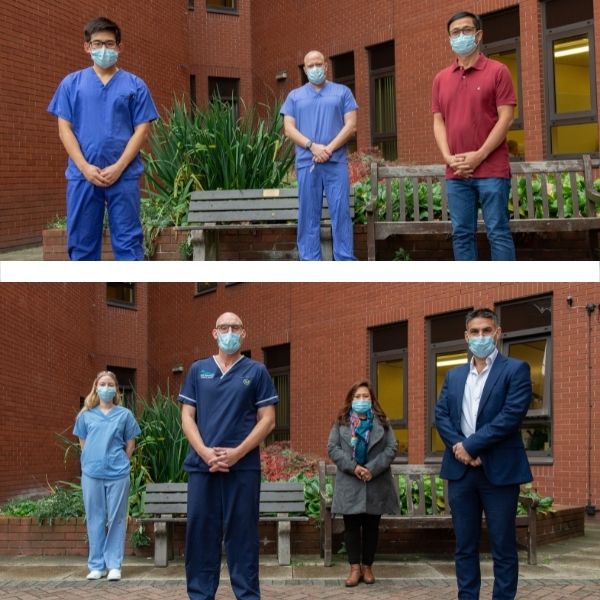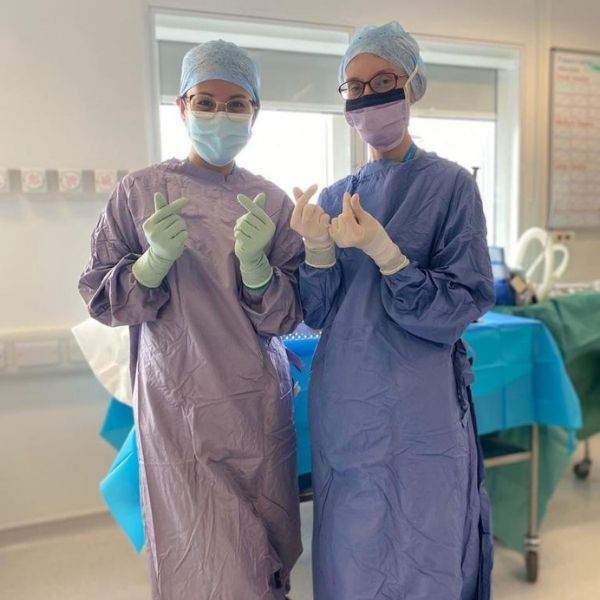
The first-ever Green Surgery Challenge anticipates a CO2 reduction of 133 tonnes per year
This year, five surgical teams from around the UK competed in the first-ever 'Green Surgery Challenge'. Through the challenge they have effectively reduced the carbon footprint of surgery by creating new devices, streamlining procedures, switching to reusable equipment, and altering the type of anaesthetic used for certain operations.
Climate change has far-reaching implications for global health, and although healthcare organisations work to improve population health, their daily operations contribute to climate change. In England, the health and care system is estimated to account for 4-5 percent of the country's carbon footprint. Operating theatres are typically the most resource-intensive area of a hospital, consuming 3-6 times more energy than the rest of the hospital, and are a large contributor of waste.
The five teams in the Green Surgery Challenge received mentoring from the Centre for Sustainable Healthcare over a ten-week period in order to refine a specific question, design a project, implement the project, and measure the outcomes. The teams used sustainable quality improvement (SusQI) methodology to create sustainable transformation.
At the Green Surgery Conference on 4th November 2021, the five teams showcased their projects, including the forecast savings and opportunities to spread and scale the changes they had made. The judging panel members were Kedar Mate, MD, President and Chief Executive Officer at the Institute for Healthcare Improvement (IHI), Mrs Scarlett McNally, Consultant Orthopaedic Surgeon at Eastbourne DGH, Mr Eniola Folaranmi, Consultant Paediatric Surgeon and Lead for Clinical Governance and Research in the paediatric surgery department at University Hospital of Wales, Mr Tim Goodacre, Vice President of The Royal College of Surgeons England and Dr Frances Mortimer, Medical Director of the Centre for Sustainable Healthcare; each of them provided valuable insights and feedback to the teams:
“Plymouth, we were impressed by the choice of your project and that you consulted the team very early on - you were therefore able to tackle problems they were having with equipment function, making for a win-win approach. It was a very thorough piece of work decreasing the single use kit within appendicectomy; the argument for capital investment in this project was compelling as the costings were very carefully worked out showing that the investment would be paid off by savings made in the first 6 months”.
 The Derriford Hospital, University Hospitals Plymouth NHS Trust team replaced single-use instruments in the laparoscopic appendicectomy set with reusable ports and other instruments which offers a forecast annual saving of 0.5 tonnes CO2e/year and £34,400. There is a great potential to scale up their work across the NHS with 42,000 appendectomies performed in the UK each year.
The Derriford Hospital, University Hospitals Plymouth NHS Trust team replaced single-use instruments in the laparoscopic appendicectomy set with reusable ports and other instruments which offers a forecast annual saving of 0.5 tonnes CO2e/year and £34,400. There is a great potential to scale up their work across the NHS with 42,000 appendectomies performed in the UK each year.
“Leeds, the new device was very impressive, facilitating a gasless endoscopic approach. Substituting insufflation, presumably applicable across all laparoscopic surgery, if that can be done not just in this country but globally, will make a remarkable reduction in CO2 within the surgical world. You also combined it with simpler changes, such as avoiding catheterisation, which can be made immediately.”
 The Leeds Teaching Hospital NHS trust team’s project included four components, replacing CO2 insufflation with the RAIS device, changing from disposable to reusable gowns and drapes, replacing urinary catheterisation with pre-induction toileting, and replacing single-use instruments with reusable instruments in the instrument tray for appendicectomy. These have a forecast savings of 110.3 tonnes CO2e and £88,695 per year.
The Leeds Teaching Hospital NHS trust team’s project included four components, replacing CO2 insufflation with the RAIS device, changing from disposable to reusable gowns and drapes, replacing urinary catheterisation with pre-induction toileting, and replacing single-use instruments with reusable instruments in the instrument tray for appendicectomy. These have a forecast savings of 110.3 tonnes CO2e and £88,695 per year.
“Sussex, reducing group and save prior to laparoscopic cholecystectomies, we were very impressed that you looked at the whole pathway not just the procedure and did a lot of patient engagement – finding out travel times, costs and so forth. Really looking at one particular area with a big review on safety, you did the groundwork which is essential to challenge established practice."
 The University Hospitals Sussex NHS Foundation Trust team’s project focused on eliminating the second Group and Save blood tests from the preoperative workup for laparoscopic cholecystectomies. It has forecast annual savings of 2.5 tonnes CO2e/year, and £3,000 for sample processing. With approximately 61,220 laparoscopic cholecystectomies performed in the UK per year, there could be potential savings of over 600 tonnes CO2e per year, and this approach could be used to address blood bottle shortages in the NHS.
The University Hospitals Sussex NHS Foundation Trust team’s project focused on eliminating the second Group and Save blood tests from the preoperative workup for laparoscopic cholecystectomies. It has forecast annual savings of 2.5 tonnes CO2e/year, and £3,000 for sample processing. With approximately 61,220 laparoscopic cholecystectomies performed in the UK per year, there could be potential savings of over 600 tonnes CO2e per year, and this approach could be used to address blood bottle shortages in the NHS.
“Wales, this dramatic reduction in equipment is possibly applicable across a much wider operative range. You certainly introduced new design rules for greening minor surgery, not just minimising single-use kit but redesigning the pathway to bypass ward admission and theatre recovery, and we were very impressed by that.”
 The Wrexham Maelor and Ysbyty Gwynedd Hospitals team devised a ‘green carpal tunnel pathway’, reducing the consumption of single-use surgical equipment, reducing size of autoclave trays, and eliminating the need for ward admission. The project has forecast annual savings of 11.6 tonnes CO2e/year and £12,641, and with 53,000 Carpal Tunnel Releases performed in the UK per year there are potential savings of 1,232,250 kgCO2e and £1,339.972/year.
The Wrexham Maelor and Ysbyty Gwynedd Hospitals team devised a ‘green carpal tunnel pathway’, reducing the consumption of single-use surgical equipment, reducing size of autoclave trays, and eliminating the need for ward admission. The project has forecast annual savings of 11.6 tonnes CO2e/year and £12,641, and with 53,000 Carpal Tunnel Releases performed in the UK per year there are potential savings of 1,232,250 kgCO2e and £1,339.972/year.
“Imperial, you tackled the whole transformation of hernia repair towards local anaesthetic, avoiding GA and reducing length of stay; you did a very comprehensive review and looked at the health economics of it as well. By combining this with the shift to reusable gowns, you demonstrated two design rules for sustainable surgery (low carbon alternatives and reuse).”
 The Imperial College Healthcare NHS Trust team selected two areas to work on; tackling the use of anaesthetic gases by encouraging the use of local anesthesia (LA) with/without sedation for inguinal hernia repair (IHR) instead of general anaesthesia (GA), and reducing the use of single-use consumables by switching from disposable sterile surgical gowns to reusable surgical gowns in two theatres. During the project period, the projects saved 1.175 tonnes CO2e and £1,276.82, which leads to a forecast annual saving of approximately 8.5 tonnes CO2e/year and £16,740. If the reusable gowns were spread to the whole trust, it could save 234.7 tonnes CO2e over a year.
The Imperial College Healthcare NHS Trust team selected two areas to work on; tackling the use of anaesthetic gases by encouraging the use of local anesthesia (LA) with/without sedation for inguinal hernia repair (IHR) instead of general anaesthesia (GA), and reducing the use of single-use consumables by switching from disposable sterile surgical gowns to reusable surgical gowns in two theatres. During the project period, the projects saved 1.175 tonnes CO2e and £1,276.82, which leads to a forecast annual saving of approximately 8.5 tonnes CO2e/year and £16,740. If the reusable gowns were spread to the whole trust, it could save 234.7 tonnes CO2e over a year.
The teams from Imperial and Wales were awarded £400 each as runners up in the Challenge, with the team from Leeds awarded the winning prize of £1,000 to reinvest in advancing their SusQI projects.
Mr Adam Peckham-Cooper, Consultant Emergency General Surgeon and Honorary Senior Lecturer, from the Leeds Teaching Hospital NHS Trust team said:
“We couldn’t have done it without them [our team]. It’s really exciting and has been a real game changer. Aaron and I, when we first met Olivia we were asked about our green credentials, we felt a bit stuck in answering that question initially, but I feel that we have been on a massive journey, and we are very much converts in driving these projects forward in the future, and I hope that we can inspire other people to do it as well”.
The combined projects of the five Green Surgery Challenge teams have projected annual savings of 133.4 tonnes CO2e, which is the equivalent of 38 round-trip flights from London to Hong Kong. With potential to be scaled and spread further within their Trusts and across the UK, these teams have transformed surgery to be more environmental sustainable, and have actively contributed to the NHS’s commitment to achieve net zero by 2040.
The Green Surgery Challenge is a special adaptation for clinical specialties of the Centre for Sustainable Healthcare’s flagship programme, the Green Ward Competition (an award-winning clinical leadership and engagement programme to improve the environmental sustainability of healthcare). The challenge has been created and delivered through collaboration with a group of supportive partners including NIHR MedTech Co-operative in Surgical Technologies, Royal College of Surgeons England, Royal College of Surgeons Edinburgh, The Sustainable Healthcare Coalition, Brighton and Sussex Medical School and the Association for Perioperative Practice. The Challenge has been made possible through the generosity of our Gold Funders and Sponsors NIHR MedTech Co-operative in Surgical Technologies and Elemental Healthcare, Silver Sponsors Royal College of Surgeons England and Royal College of Surgeons Edinburgh, Bronze Sponsors the AHSN Network, Vanguard Medical Remanufacturing, and Bowa Medical UK. For more information, please click here.

